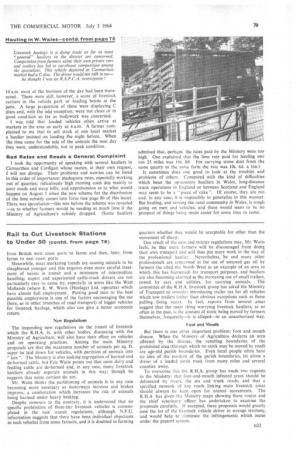Rail to Cut Livestock Stations to Under 50 (contd from page 76)
Page 81

If you've noticed an error in this article please click here to report it so we can fix it.
from British west coast ports to farms and then, later, from farms to east coast ports.
Meanwhile, meat marketing trends are causing animals to be slaughtered younger and this requires even more careful treat-. ment of beasts in transit and a minimum of intermediate handling; expert and experienced cattle-truck drivers are not particularly easy to come by, especially in areas like the West Midlands (where E. W. Watts (Haulage) Ltd. operates) which have almost full employment. Putting good men to the best possible employment is one of the factors encouraging the use (here, as in other branches of road transport) of bigger vehicles for livestock haulage, which also can give a better economic return.
New Regulations The impending new regulations on the transit of livestock which the R.H.A. is, with other bodies, discussing with the Ministry of Agriculture, will also have their effect on vehicles and on operating practices. Among the main Ministry proposals are that the maximum number of animals per sq. ft. super be laid down for vehicles, with partition of animals into "lots ". The Ministry is also seeking segregation of horned and de-horned cattle, but Eric Watts points out that most dairy and feeding cattle are de-horned and, in any case, many livestock hauliers already separate animals in this way; though he suggests that some carriers do not.
Mr_ Watts thinks the partitioning of animals is in any case becoming more necessary as motorways increase and brakes improve, a combination which increases the risk of animals being harmed under heavy braking.
Despite rumours to the contrary, it is understood that no specific prohibition of three-tier livestock vehicles is contemplated in the new transit regulations, although N.F.U. information suggests that there have been individual objections to such vehicles from some farmers, and it is doubted in farming quarters whether they would be acceptable for other than the movement of sheep.
One result of the new and stricter regulations may, Mr. Watts feels, be that more farmers will be discouraged from doing their own transport and will thus put more work in the way of the professional haulier. Nevertheless, he and many other professionals are concerned at the use of untaxed gas oil by farmers (he cited the North West as an example of an area in which this has happened) for transport purposes, and hauliers are also becoming alarmed at the increasing use of small trailers, towed by cars and utilities, for carrying animals. The committee of the R.H.A. livestock group has asked the Ministry of Transport to consider introducing trailer tax for all vehicles which tow trailers (other than obvious exceptions such as those pulling living vans). In fact, reports from several areas suggest that the main thing worrying livestock hauliers, as so often in the past, is the amount of stock being moved by farmers themselves, frequently—it is alleged—in an unauthorized way.
Foot and Mouth But there is one other important problem: foot and mouth disease. When the Ministry of Agriculture declares an area affected by the disease, the resulting boundaries of the prohibited area (through which no stock may be moved by road) are age-old parish boundaries. Even local people often have no idea of the position of the parish boundaries, let alone a driver of a loaded cattle truck from many miles and several counties away.
To overcome this the R.H.A. group has made two requests to the Ministry: that foot-and-mouth infected areas should be delineated by rivers, the sea and trunk roads; and that a specified network of key roads linking main livestock areas should always be kept open for animal movements. The R.H.A.has given the Ministry maps showing these routes and the chief veterinary officer has undertaken to examine the proposals carefully. If accepted, these proposals would greatly ease the lot of the livestock vehicle driver in strange territory, and would help to eliminate the infringements which occur under the present system.












































































































































